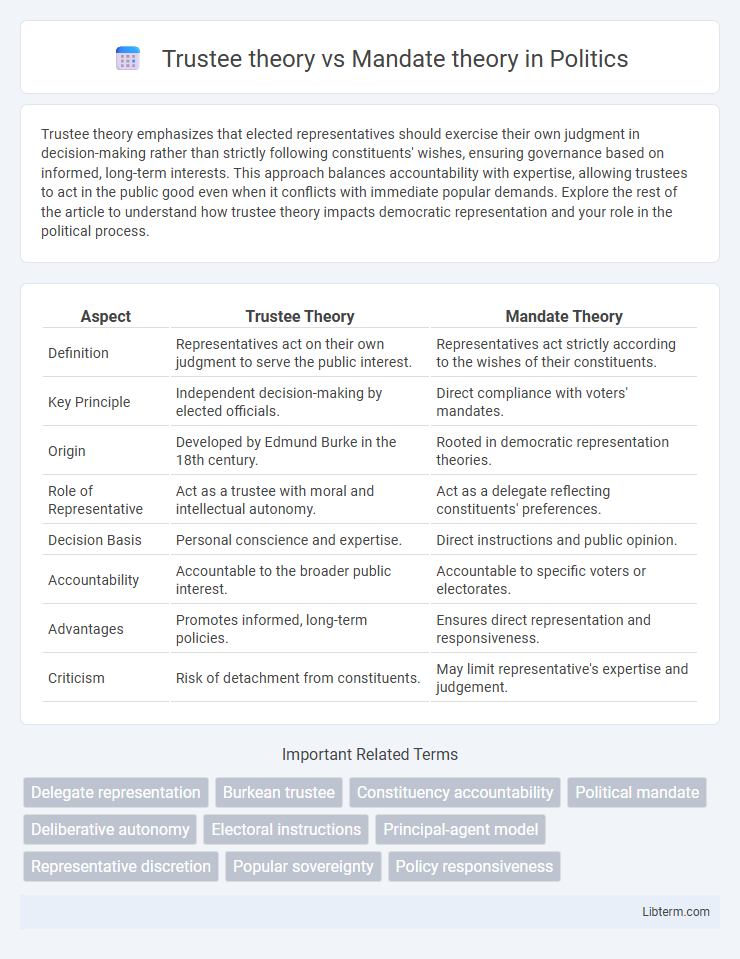Trustee theory emphasizes that elected representatives should exercise their own judgment in decision-making rather than strictly following constituents' wishes, ensuring governance based on informed, long-term interests. This approach balances accountability with expertise, allowing trustees to act in the public good even when it conflicts with immediate popular demands. Explore the rest of the article to understand how trustee theory impacts democratic representation and your role in the political process.
Table of Comparison
| Aspect | Trustee Theory | Mandate Theory |
|---|---|---|
| Definition | Representatives act on their own judgment to serve the public interest. | Representatives act strictly according to the wishes of their constituents. |
| Key Principle | Independent decision-making by elected officials. | Direct compliance with voters' mandates. |
| Origin | Developed by Edmund Burke in the 18th century. | Rooted in democratic representation theories. |
| Role of Representative | Act as a trustee with moral and intellectual autonomy. | Act as a delegate reflecting constituents' preferences. |
| Decision Basis | Personal conscience and expertise. | Direct instructions and public opinion. |
| Accountability | Accountable to the broader public interest. | Accountable to specific voters or electorates. |
| Advantages | Promotes informed, long-term policies. | Ensures direct representation and responsiveness. |
| Criticism | Risk of detachment from constituents. | May limit representative's expertise and judgement. |
Introduction to Trustee and Mandate Theories
Trustee theory emphasizes that elected representatives should use their own judgment to make decisions in the best interest of the public, acting as trustees rather than mere delegates. Mandate theory asserts that representatives must strictly follow the instructions and preferences of their constituents, serving as agents who execute the democratic mandate given by voters. These contrasting approaches shape debates about political representation, accountability, and the role of elected officials in democratic governance.
Defining the Trustee Theory
The Trustee Theory defines a representative's role as making decisions based on their own judgment and conscience, rather than strictly following the explicit wishes of their constituents. This theory emphasizes the responsibility of elected officials to use their expertise and insight to act in the best long-term interests of the public. It contrasts with the Mandate Theory, where representatives are seen as direct agents obligated to implement the specific instructions of their electorate.
Defining the Mandate Theory
Mandate theory defines the role of representatives as agents directly bound by the explicit instructions and preferences of their constituents, emphasizing accountability through adherence to voter mandates. Unlike trustee theory, which allows representatives to exercise independent judgment, mandate theory requires faithful execution of the electorate's expressed wishes. This concept prioritizes democratic legitimacy by ensuring that elected officials act as instruments of popular will rather than autonomous decision-makers.
Historical Development of Both Theories
Trustee theory originated in the 19th century, notably advocated by Edmund Burke, emphasizing that elected representatives should use their own judgment to make decisions for the public good, even if it contradicts immediate popular opinion. Mandate theory emerged in the early 20th century, emphasizing that representatives act as direct agents of their constituents, obligated to execute their electoral promises and preferences. The historical development of these theories reflects evolving democratic principles, balancing individual judgment with the demands of representative accountability.
Key Philosophers and Proponents
Trustee theory is closely associated with Edmund Burke, who argued that elected representatives should use their own judgment to make decisions in the public interest, rather than simply following constituents' wishes. Mandate theory, championed by political theorists like Jean-Jacques Rousseau, holds that representatives are bound to act according to the explicit instructions of their electorate. Burke's approach emphasizes the responsibilities of trusteeship and autonomy, while Rousseau's mandate theory highlights direct accountability and popular sovereignty.
Trustee Theory: Strengths and Criticisms
Trustee theory emphasizes that elected representatives act based on their judgment and expertise, prioritizing the long-term interests of their constituents over immediate public opinion, which strengthens informed decision-making and accountability. This approach fosters policy stability and encourages leaders to address complex issues beyond popular demands. However, criticisms highlight the risk of disconnect from voters' preferences and potential abuse of power due to the lack of direct accountability.
Mandate Theory: Strengths and Criticisms
Mandate theory emphasizes that elected representatives act as delegates strictly following the wishes of their constituents, reinforcing democratic accountability and ensuring direct representation. Strengths include heightened responsiveness to voter preferences and clearer electoral mandates, promoting transparency in legislative decision-making. Criticisms highlight the theory's potential to limit representatives' use of expertise and judgment, leading to short-termism and challenges in addressing complex policy issues requiring nuanced understanding.
Practical Implications in Modern Governance
Trustee theory empowers elected officials to use their judgment in decision-making, fostering long-term policy solutions aligned with public interest, while mandate theory emphasizes strict adherence to electoral promises, ensuring direct representation of voter preferences. In modern governance, trustee theory encourages flexibility and expert-driven governance, suitable for complex policy environments, whereas mandate theory promotes accountability and transparency by holding politicians to explicit campaign commitments. Balancing these approaches affects legislative effectiveness, public trust, and responsiveness to evolving societal needs.
Trustee vs Mandate in Contemporary Democracies
Trustee theory in contemporary democracies emphasizes elected representatives acting on their own judgment to make decisions for the public good, prioritizing expertise and long-term benefits over direct voter preferences. Mandate theory, conversely, holds representatives strictly accountable to the explicit wishes and instructions of their constituents, reflecting a more direct form of democratic responsiveness. Balancing trustee independence with mandate accountability remains a central tension in modern representative governance, influencing policy outcomes and public trust.
Conclusion: Relevance and Future Perspectives
Trustee theory emphasizes the autonomy of elected officials to use their judgment in decision-making, prioritizing long-term public interest, while mandate theory highlights adherence to the explicit wishes of constituents as expressed through elections. Future perspectives suggest hybrid models may emerge, blending accountability with informed discretion to address complex governance challenges and enhance democratic responsiveness. The evolving political landscape demands theories that balance representation fidelity with effective policy leadership for sustainable governance.
Trustee theory Infographic

 libterm.com
libterm.com